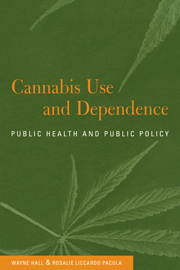Book contents
- Frontmatter
- Dedication
- Contents
- List of figures and tables
- Foreword
- Acknowledgements
- 1 Introduction
- Section 1 Cannabis the drug and how it is used
- Section 2 The health effects of cannabis
- 4 The acute effects of cannabis
- 5 The cellular, immunological and reproductive effects of chronic cannabis use
- 6 The cardiovascular, respiratory and gastrointestinal effects of chronic cannabis use
- Section 3 The psychological effects of chronic cannabis use
- Section 4 Effects on adolescent development
- Section 5 Harms and benefits of cannabis use
- Section 6 The effectiveness and costs of cannabis prohibition
- Section 7 Policy alternatives
- Appendix 1
- Appendix 2
- References
- Index
4 - The acute effects of cannabis
from Section 2 - The health effects of cannabis
Published online by Cambridge University Press: 05 July 2016
- Frontmatter
- Dedication
- Contents
- List of figures and tables
- Foreword
- Acknowledgements
- 1 Introduction
- Section 1 Cannabis the drug and how it is used
- Section 2 The health effects of cannabis
- 4 The acute effects of cannabis
- 5 The cellular, immunological and reproductive effects of chronic cannabis use
- 6 The cardiovascular, respiratory and gastrointestinal effects of chronic cannabis use
- Section 3 The psychological effects of chronic cannabis use
- Section 4 Effects on adolescent development
- Section 5 Harms and benefits of cannabis use
- Section 6 The effectiveness and costs of cannabis prohibition
- Section 7 Policy alternatives
- Appendix 1
- Appendix 2
- References
- Index
Summary
Psychological effects
The main reason why most young people use cannabis is to experience mild euphoria, relaxation and perceptual alterations, including time distortion, and the intensification of experiences, such as, eating, watching films, listening to music, and engaging in sex (Tart, 1970; Jaffe, 1985). When used in a social setting, the 'high’ may be accompanied by infectious laughter, talkativeness, and increased sociability. The effects of cannabis depend upon the dose received, the mode of administration, the user's prior experience with cannabis, concurrent drug use, and the ‘set and setting’ - the user's expectations, attitudes towards cannabis, mood state, and the social setting in which it is used (Jaffe, 1985).
Cognitive changes include impaired short-term memory and attention that make it easy for the user to become lost in pleasant reverie and difficult to sustain goaldirected mental activity (Solowij, 1998; Beardsley and Kelly, 1999). Motor skills, reaction time, motor coordination and many forms of skilled psychomotor activity are impaired while the user is intoxicated (Jaffe, 1985; Beardsley and Kelly, 1999).
Some users report unpleasant experiences after using cannabis. These include anxiety, panic, a fear of going mad, and depression (Smith, 1968; Weil, 1970; Thomas, 1993). These are often reported by inexperienced users (Weil, 1970), including patients given oral THC for medical reasons (Institute of Medicine, 1999). More experienced users may report these effects after oral cannabis use because its effects may be more pronounced and of longer duration than they are used to after smoking. These effects can be prevented by preparation of users about the effects they may experience and they can be managed by reassurance and support (Smith, 1968; Weil, 1970). Psychotic symptoms, such as delusions and hallucinations, are very rare experiences that may occur at very high doses of THC, and perhaps in susceptible individuals at lower doses (Smith, 1968; Weil, 1970; Thomas, 1993) (see Chapter 10 below).
Physical effects
The most immediate effect of smoking cannabis is to increase heart rate by 20% to 50%. This occurs between a few minutes and a quarter of an hour after smoking cannabis (Huber et al., 1988; Chesher and Hall, 1999; Jones, 2002).
- Type
- Chapter
- Information
- Cannabis Use and DependencePublic Health and Public Policy, pp. 38 - 45Publisher: Cambridge University PressPrint publication year: 2002



